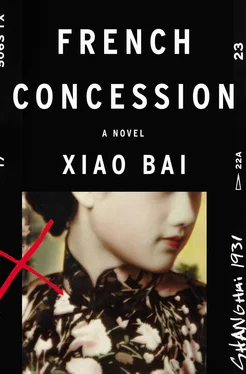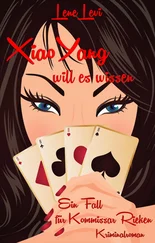In fact, Irxmayer and Co. traded across Asia in ammunition and firearms. Beneath the hay and durable oilcloth in its wooden crates lay deadly weapons that could be used to assassinate a man, intimidate him, play Russian roulette, or even to start a war.
JUNE 2, YEAR 20 OF THE REPUBLIC.
9:50 A.M.

Margot ran toward Therese’s Ford car as soon as it had driven past the fence.
They were at the home base of the Shanghai Paper Hunt Club, north of a stream called Rubicon Creek on maps. The rules of the hunt were as follows: the club nominated a master who laid a paper trail by scattering scraps of colored paper from a large bag he carried across country, and the riders would have to follow the route he laid out to the finishing point. For thirty years now, the master had been Ah Pau, who had an endlessly inventive Chinese sense of humor. He scattered scraps of paper in the crannies between rocks, under tufts of grass, hid them in ditches and under bridges. Once he strung them across the river on a piece of fishing line, causing several contestants to fall in. No one could guess what Ah Pau had up his sleeve, which was why Brenen had Margot study the map closely.
The map had been drawn by early pathfinders in the club, who invented names such as Three Virgins’ Jump and Sparkes Water Wade. Margot once asked Brenen out of curiosity: “But what do the Chinese call these places? They must have Chinese names — they aren’t even inside the concessions.”
Brenen had given her an answer in the true colonial spirit: “Who cares what they call it? Once we give it a name, it’s ours.”

The Shanghai Paper Hunt Club’s race at Rubicon Creek
Her husband, Baron Franz Pidol, would have approved of that answer. The Luxembourg United Steel Company’s chief representative in Shanghai, he spent most of his energies speculating on land, and he currently had his sights on a field near Rubicon Creek. “Even that old cripple, Sir Victor Sassoon, has his eyes on the creek,” said Franz.
The Board of Works had been planning to build roads west of the concessions toward the creek. Their timing was perfect. After years of flooding along Lake T’ai’s river system, to which the creek belonged, all the fields were now barren.
Here in Shanghai, Franz was in his element. Others might think the muggy nights and mosquitoes a nuisance, but all it seemed to do to Franz was prevent him from ever visiting Margot’s bedroom. It was unlikely that he never slept with anyone else. The talkative Mrs. Liddell told Margot that all the men took Chinese lovers. They all fell in love with the place, with the social scene, with smoking Luzon cigars and playing cards, and with the superior goods on offer at the brothel on Avenue Haig, where the women did not sit naked in the sitting room the way they did elsewhere. Subtlety was more to the taste of the worldly businessmen whose circle Franz was about to join.
Margot was lonely. Until Franz declared that he was in love with Shanghai, Margot had been counting on going home when his three-year contract ended. Was it really so easy to fall in love with a place? Wasn’t it much easier to fall in love with a person, like Brenen?
Brenen Blair had fallen in love with Margot the moment he saw her. Margot only had two friends in Shanghai, and apart from Therese, Brenen was the only person in whom she could confide. In the tearoom at Arnhold & Co., Brenen had suggested she buy parchment lamp shades bordered with dark gold, as she was looking to change the lamp shades in her bedroom. It was the first time they had met. Only much later would he have a chance to admire the lit lamp shades, when Franz had begun to travel inland frequently by train.
Mrs. Liddell said that although Mr. Blair was young, he was a veteran diplomat, who had proved himself capable of handling tricky situations during postings to Australia and India. He was currently a political adviser to the Nanking government. As the go-between for the colonial British government and the Nanking government, he had the right to convey his views directly to the Foreign Office in London without going through the British consul in Shanghai, Mr. Ingram, or through the British temporary representative office in Beijing.
Brenen suggested that Margot join the Shanghai Women’s Equestrian Club, and Franz supported the idea. The two of them accompanied her to the stables of the riding school on Mohawk Road, and picked out a gray mare flecked with white. Franz could not understand why Margot wanted to name the horse Dusty Answer. The odd name was actually Brenen’s idea. Franz had been cordial to Brenen until they had summered together in Mo-kan-shan, the mountains near Shanghai, where Franz had just bought a plot of land and built a summer resort. When they got back, he began assiduously to avoid all social occasions at which Mr. Blair might appear.
Margot showed Therese into the club grounds. The grass had been freshly mowed. The Chinese servant at the club had been busy since dawn, carrying bamboo chairs out of storage and wiping them down, filling silver buckets with a cocktail made from rock sugar and gin. The grass was dotted with wildflowers that attracted bees and butterflies to buzz about your ankles. A water buffalo burned black by the sun lazed on the southern shore of Rubicon Creek. The club used to wait until the end of November to put on its official competition. By then, the beans and cotton would have been harvested, the winter crop of wheat planted, and the weather would be at its mildest. But since the arable land had all turned to wasteland after the flooding, the committee had been happy to arrange a few more contests. After all, the Depression meant the men had more free time, and they needed the exercise.
They found a bamboo table beneath the oleander tree. The men were arguing by the stables. Mario, the man with the loudest voice, was an Italian illustrator who drew cartoons for the foreign newspapers in the Concession. They said he had been beaten up in a bar in Hongkew by a band of Japanese rōnin . The illustrator was arguing with people, among them the British businessman whom Margot knew to be in Franz’s set. “It’s time we taught Nanking a lesson,” the British man cried. “We should have the Japs do it. They could even start a little war. We’d get new treaties and new boundaries for the concessions, maybe even fifty kilometers on either side of the Yangtze!”
“Wouldn’t that be a windfall for you,” Mario replied frostily. “With all that land you’ve bought, a war would keep you out of bankruptcy court!” His voice grew louder. “You idiots, wake up. There’s no more striking it rich out here. The Great War was the end of that. If the Japanese get here, they’ll ruin us all.”
Compared to the rest of the crowd, Brenen was tall and thin. He came over to keep them company while they examined the horse.
The crown of the chinquapin tree hung over the fence. The gray mare stood beneath it while the stable hand in his blue jacket stroked her neck, tightened the girth, and lifted the saddle to reveal her mane, which had been neatly braided. The scent of bay leaves wafted toward them, and the mare grew fidgety, snorting and pawing vigorously at the ground. To join the club, Margot had had to buy a horse, because competing horses had to be the bona fide property of club members. They had to be Chinese horses, though strictly speaking, that meant they were small Mongolian horses, crossbred from English purebreds and Mongolian horses, as Brenen had once explained to her. Her mare was a crossbreed too. Look at her hips, he explained, smacking the horse’s ass in front of the Cossack horse dealer on Mohawk Road. Purebred Mongolian horses have sloping hips, while English horses have arched hips. This horse is descended from the herd of English stallions that the tsar bought, because he was convinced that his Cossack cavalrymen would defeat Napoleon as long as they were mounted on horses with the wide hips of English purebreds.
Читать дальше














